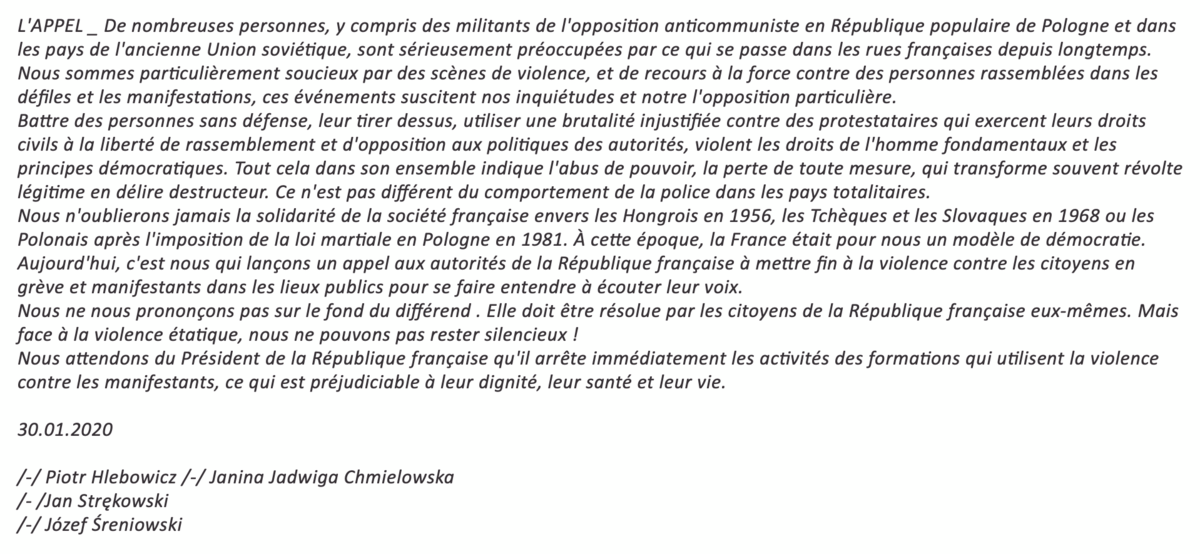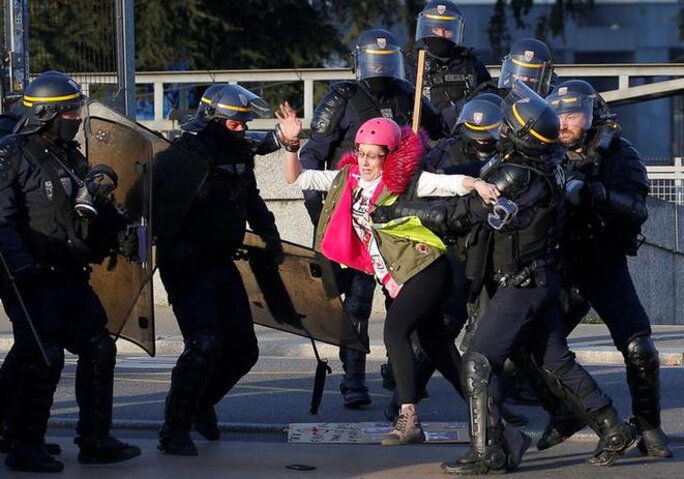During a two-day official visit to Poland this week, French President Emmanuel Macron blew hot and cold on strained bilateral relations, which have become clouded over the past two years by the nationalist conservative Polish government’s conflictual stance within the European Union, including on climate policy goals, and above all its domestic reforms to give it firm control over courts and judges in flagrant contradiction with rule-of-law commitments required of EU member states.
Arriving in Warsaw on Monday at the start of his visit, he said he hoped it will “mark a real turning point in the role that together we can play for the Europe of tomorrow”. But the following day, speaking to an audience of students at Jagiellonian University in the southern city of Cracow, he took aim at the Poland’s ruling nationalist conservative Law and Justice party (PiS), in power since 2015, slamming what he called, “a nationalist resurgence in negation of European political principles”.
The judicial reforms, mirrored by others in Hungary, have brought Poland into open conflict with the EU institutions championed by Macron. In similar tone to a European Parliament resolution passed in mid-January, which underlined the “worsened” state of rule of law in Poland and Hungary, Macron warned that EU subsidies to help Poland’s transition to reduce its CO2 emissions come at a price. “Don’t believe those who say to you ‘Europe will give me money with one hand to carry out my climate transition, but it will leave me my political choices with the other’,” he told the students. “It’s not true. Europe is a bloc, a bloc of values, a bloc of [legislative] texts, a bloc of ambitions.”
But the French president’s swipe at Poland’s ruling party prompted a swift counter-attack by its members in the European Parliament (MEPs). On Wednesday this week, Polish MEP Jacek Saryusz-Wolski, a former vice-president of the parliament who led the rightwing PiS -Alliance-Solidarity Poland list of MEP candidates in his country in the May 2019 European elections, sent out a caustic email to all his fellow MEPs appealing to them, in its French version, to “sign the petition which the former opponents of the communist regime have addressed to President E. Macron in order to demand him to stop the violence against citizens by the authorities of the French republic”.
Saryusz-Wolski was referring to the numerous recorded incidents of police violence during recent demonstrations in France, notably by the so-called ‘yellow vest’ grass-roots, anti-establishment movement of protest over wide-ranging social injustices, including the financial hardships of many low- and middle-income earners. The use by French crowd control police of an arsenal of offensive weapons, including rubber bullets and tear-gas and dispersion grenades, have left hundreds of protesters with injuries, including dozens who lost limbs and eyes.

Enlargement : Illustration 1

The petition incensed French MEP Stéphane Séjourné, who heads the group of MEPs from Macron’s LREM party, affiliated to the Renew Europe bloc in the parliament, who on Thursday responded to it with his own email.
Addressed to "Dear Jacek" but also sent to all those who received the petition, Séjourné, a former political advisor to Macron, replying to Saryusz-Wolski’s comments about the “violence” of the French authorities, wrote: “Is there in France an organised effort by the authorities aimed at harming citizens’ physical integrity? Is it possible in France for a citizen to obtain damages for a disproportionate use of force by the authorities? Is France governed by unelected individuals? Is the right to strike, to demonstrate, to debate flouted in the street, in the media, including public [state-funded media]? Of course not.”

Enlargement : Illustration 2

But Séjourné’s response sat awkwardly with international reactions to the heavy-handed policing of demonstrations in France.
On February 14th 2019, the European Parliament adopted, by a large majority, a non-binding resolution that condemned “the use of violent and disproportionate interventions by state authorities during protests and peaceful demonstrations”.The resolution, which did not target any particular country, called on EU member states to ensure that the use of force by law enforcement authorities is always lawful, proportionate, necessary and the last resort, and that it preserves human life and physical integrity; notes that the indiscriminate use of force against crowds contravenes the principle of proportionality.”
“It is only in France, Poland and Greece where there is an unlimited use of these instruments which […], according to medical teams, cause war wounds,” commented at the time French Green party MEP Yannick Jadot. A few days later, on February 26th 2019, Council of Europe commissioner for human rights, Dunja Mijatović, issued a memorandum explicitly addressing the situation in France, entitled “Maintaining public order and freedom of assembly in the context of the ‘yellow vest’ movement”. The introduction to the document said Mijatović “has been keeping close track of the events linked to the “yellow vest” movement in France since mid-November 2018,” and that “The increasing number of violent incidents, reported by a very large number of media outlets, confirmed by information passed on to her by national human rights bodies and borne out by evidence received directly by her Office, prompted her to make an official visit to Paris on 28 January 2019.”
The memorandum noted that after the French president’s attempts to meet some of the demands of the ‘yellow vests’ in early December, “the demonstrations continued and the number of wounded has increased steadily, reaching, according to the Ministry of the Interior’s figures of 4 February 2019, a level of 2,060 among the demonstrators, including 69 “extreme emergencies”, and 1,325 wounded among the law enforcement officers. The Commissioner is extremely concerned at the level of violence reflected in these figures, which many of those she talked to described as unprecedented in France in the last fifty years.”

Enlargement : Illustration 3

The document added that the French interior ministry recorded that “12,122 LBD [rubber bullet] rounds, 1,428 instant tear gas grenades and 4,942 hand-held sting grenades were fired or thrown between the beginning of the yellow vest movement and 4 February 2019. She is concerned at the high level of use of these so-called intermediate weapons despite the fact that their deployment is restricted and they can cause serious injury." Mijatović recommended the French authorities “should suspend the use of LBDs [rubber bullet launchers] during operations aimed at maintaining public order”.
Speaking on March 6th last year, the United Nations High Commissioner for Human Rights, Michelle Bachelet, in her annual address to the UN Human Rights Council in Geneva, said: "The 'Gilets Jaunes' [yellow vests] have been protesting what they see as exclusion from economic rights and participation in public affairs […] We encourage the government to continue dialogue, including follow-up to the national discussions which are currently underway, and urge full investigation of all reported cases of excessive use of force".
The French government sent a 21-page written response to the UN the following month. French daily Le Monde, which obtained access to the document , reported that it underlined “particularly difficult” conditions for the police and gendarmerie in maintaining order during the protests which were “marked by grave [acts of] violence committed by some demonstrators towards the forces of law and order, journalists present and other people”. It justified the use of the police arsenal of offensive weapons, arguing the legal framework of their deployment was not that of demonstrations, but of policing “mobs”.
Those arguments are the same as used by MEP Stéphane Séjourné in his response to the email circulated by the Polish MEPs. In that reply, Séjourné spoke of “an ever more unpredictable and radical violence” employed in the street protests in France over the past 15 months, while recognising that “some law and order agents have committed errors”.
“We know how to look at ourselves in the face, and have last March launched a revision of the national [strategy] plan for maintaining order,” he continued. “France is a constitutional state where the proportionate use of force by the forces of law and order is strictly controlled and regulated […] The justice system in France is independent every individual can turn to it if they consider that there was a disproportionate use of force or that their rights have not been fully respected.”
In November 2019, Paris public prosecutor Rémy Heitz announced that only 146 out of the 212 cases of alleged abusive behaviour by police officers which were handed to the police internal investigation branch, the IGPN, were passed on to the prosecution services. Out of those 146 cases, 54 were subsequently closed without further action taken. One of these involved a 19-year-old woman in Marseille, who in December 2018, Mediapart revealed, suffered a fractured skull and brain injuries after she was beaten by a group of police as she returned home from work close to a ‘yellow vest’ demonstration (see Mediapart’s report here).
Contacted by Mediapart, Stéphane Séjourné declined to offer any further comment to the petition launched by the Polish MEPs. “My reply will suffice in itself, I think,” he said.
-------------------------
- The French version of this report can be found here.


